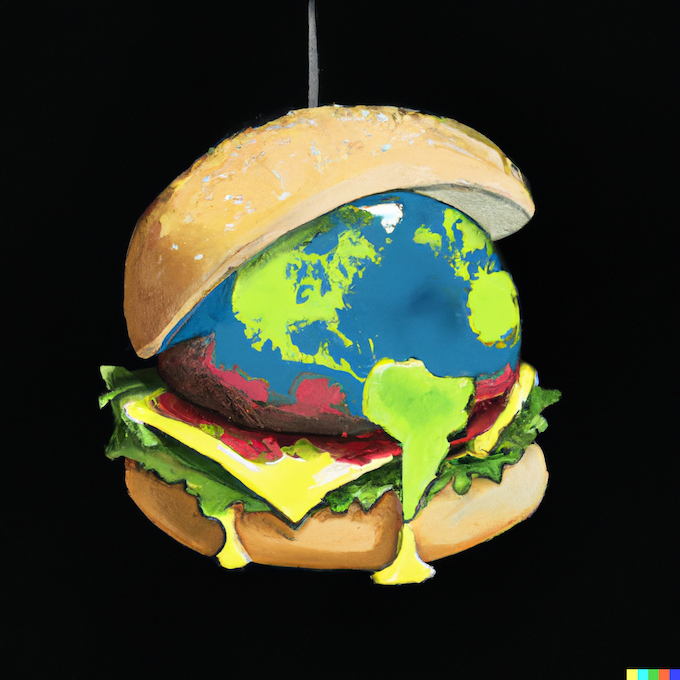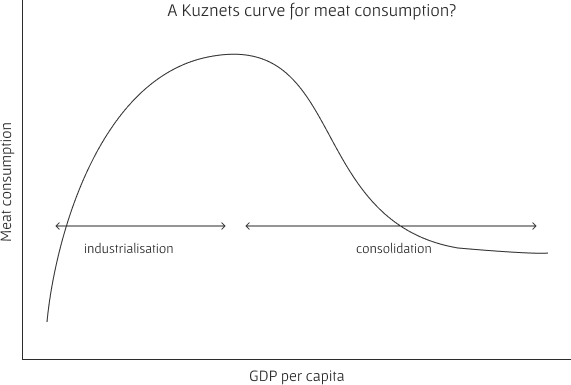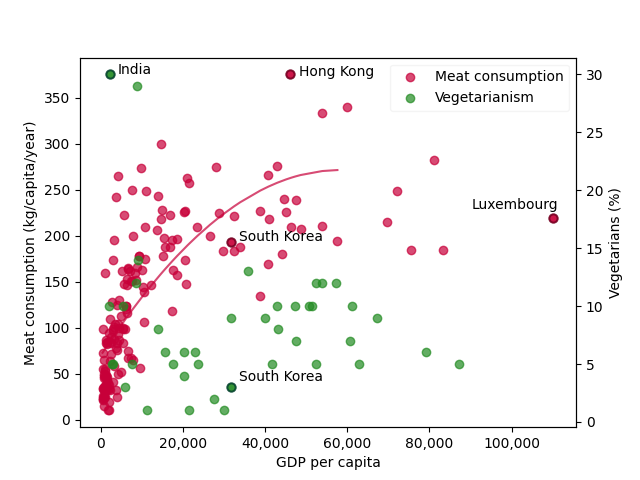Why does South Korea eat so much meat?
South Korea has a very high percentage of meat eaters. My Korean tutor says he has never met anyone vegetarian — ever. South Korean meat dishes from bulgogi to barbeque are delicious but even vegetable based dishes like kimchi contain fish or are cooked in a meat broth, rendering them inedible to vegetarians. Why?

I would expect meat consumption to drop as a country gains in wealth. Emissions due to eating meat are in general, bad, and factory farming is in general, bad. As countries' GDP per capita rises more individuals eat meat as they no longer must eat vegetables out of fiscal necessity. But as GDP continues to rise I would like to think there’s an inflection point at which individuals make the decision to consume less meat, for environmental or ethical reasons 1.
A sort of meat-eating Kuznets curve if you will. 2

This is not what seems to happen. Korea has been eating more and more meat over time with no end in sight. Considering poultry: Korea ate about 600g per person in 1962, when GDP per capita was around $100, to about 21.2kg of poultry consumed per capita in 2021 when GDP per capita was $34,758.
Some reasons why this might be the case:
- Meat consumption or vegetarianism is inaccurately measured. The data reports that South Korea has a vegetarianism rate of 3%, which is not what I see anecdotally. Vegetarian restaurants in Seoul are hard to come by.
- Korea has a high cultural ‘stickiness’, ingrained cultural ideas such as the sharing of meat dishes are harder to break because Korea scores very highly on measures of collective identity.
- We haven’t yet reached the point where Korea or any country is rich enough to start caring enough about meat consumption.
- 치맥, Chimaek (chicken and beer) a portmanteau of chikin and maekju/beer is a combination made in heaven.

Meat consumption in red and vegetarianism in green against GDP per capita with South Korea and outliers highlighted. There may be a trend for meat consumption to plateau with weight, although it seems to early to tell, inaccurate trend-line mine.
There’s lots to consider here! Most interestingly to me, is morality ‘sticky’? Once a society starts valuing the environment, wildlife, and so on, will a subsequent drop in the wealth of the society cause attitudes to reverse?
A personal plea
This post was spurred because I’m going to Korea with my wonderful partner next month and we are struggling to find vegan restaurants, or restaurants with vegan options. Bonus points for vegan 치맥! Please email me if you have any suggestions.
Also, recommendations for great books to provide me more context on Korea would always be appreciated.
Data used as CSV downloads:
- Meat consumption data from Our World in Data
- GDP data from The World Bank
- Vegetarianism rates from Wikipedia
-
If a society becomes rich enough that suffering may be ‘priced in’ to meat, with every animal enjoying a life as happy as a Swiss cow’s, would vegetarianism then decline again? ↩︎
-
The original Kuznets curve applies to economic inequality, but I much prefer its environmental version, where environmental degradation at first increases, then decreases with a nation’s wealth. ↩︎